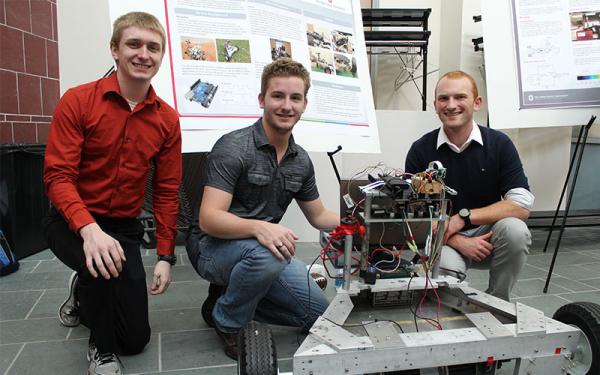Physics Programs
The OSU Department of Physics offers two undergraduate major programs, one minor program, and one certificate program. You are welcome to contact a physics advisor with questions about any of these programs.
Physics major programs

The Physics major program was established at OSU in 1929. Students choose from one of four focuses based on their post-graduation plans. All focuses lead to a Bachelor of Science in Physics which allows a student a wide range of opportunities including employment industry or a national lab or advanced study in disciplines such as physics, astronomy, math, engineering, and business. This degree comes from the College of Arts and Sciences.

The B.S. in Engineering Physics, established at OSU in 1923, allows students with a wide range of technical interests to study extensively in both physics and one of eight areas of engineering. A Bachelor of Science in Engineering Physics allows students to begin graduate work in either physics or engineering or begin full time employment as a physicist or engineer in industry or a national lab. This degree comes from the College of Engineering.
Physics major programs

The Physics major program was established at OSU in 1929. Students choose from one of four focuses based on their post-graduation plans. All focuses lead to a Bachelor of Science in Physics which allows a student a wide range of opportunities including employment industry or a national lab or advanced study in disciplines such as physics, astronomy, math, engineering, and business. This degree comes from the College of Arts and Sciences.

The B.S. in Engineering Physics, established at OSU in 1923, allows students with a wide range of technical interests to study extensively in both physics and one of eight areas of engineering. A Bachelor of Science in Engineering Physics allows students to begin graduate work in either physics or engineering or begin full time employment as a physicist or engineer in industry or a national lab. This degree comes from the College of Engineering.
Physics minor and certificate programs

After students complete the introductory physics sequence, they can complete the physics minor by taking four additional courses within the department. Elective course options include mechanics, electromagnetism, optics, theoretical mechanics, quantum mechanics, statistical mechanics, and more.

The Computational Physics Certificate is a certificate program through the Department of Physics and the College of Arts and Sciences. Students in the program engage in a coherent set of undergraduate coursework to prepare for and pursue computational physics as a career or to apply these skills in a research or graduate program.
Physics minor and certificate programs

After students complete the introductory physics sequence, they can complete the physics minor by taking four additional courses within the department. Elective course options include mechanics, electromagnetism, optics, theoretical mechanics, quantum mechanics, statistical mechanics, and more.

The Computational Physics Certificate is a certificate program through the Department of Physics and the College of Arts and Sciences. Students in the program engage in a coherent set of undergraduate coursework to prepare for and pursue computational physics as a career or to apply these skills in a research or graduate program.
